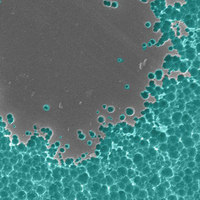Accidental Mutation Creates Better Plastic Eating Bacteria
 Apr-17-18
Created by accident, the improved plastic-eating PETase enzyme could offer a new way to deal with plastic waste.
Apr-17-18
Created by accident, the improved plastic-eating PETase enzyme could offer a new way to deal with plastic waste.The PETase enzyme is known for its ability to help the microbe Ideonella sakaiensis digest and break down PET plastic. While studying the structure of the enzyme, the research team accidentally introduced a mutation that makes it even more effective at degrading PET, as well as being able to degrade the PET alternative PEF.
According to University of Portsmouth professor John McGeehan, "Although the improvement is modest, this unanticipated discovery suggests that there is room to further improve these enzymes, moving us closer to a recycling solution for the ever-growing mountain of discarded plastics."
Thumbnail Credit - Dennis Schroeder / NREL - Electron microscope image of enzyme degrading PET plastic
Image Credit - Stefan Venter/UPIX Photography- Professor John McGeehan
More Info about this Invention:
[SCIENCEALERT.COM][UOPNEWS. PORT.AC.UK]

Add Your Comment